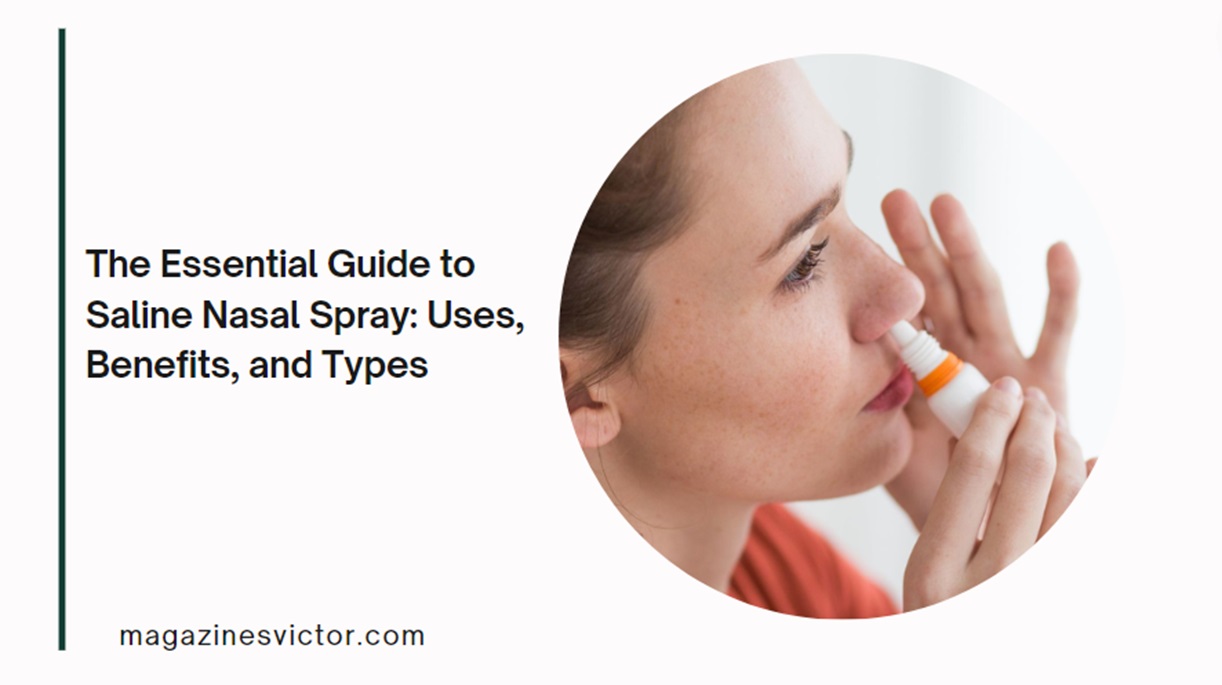
saline nasal spray
Saline nasal spray is a solution of salt and water designed for nasal use. The term “saline” refers to the salt content of the spray. This spray can help alleviate congestion and other symptoms related to allergies. Additionally, it is useful for addressing nasal dryness and nosebleeds.
Available over-the-counter at drugstores or online, saline nasal spray can also be prepared at home using a spray bottle to apply it to your nasal passages.
Table of Contents
Benefits of Saline Nasal Spray
Moisturizing and Clearing
Saline nasal spray helps moisturize dry nasal passages, providing relief. When congested, it effectively clears mucus and crusts from the nasal passages, easing the stuffed-up feeling. Saline spray or irrigation cleanses nasal passages by washing away pollen and other allergens, potentially reducing allergy symptoms and offering protection against certain infections.
Types of Saline Nasal
Over-the-Counter and Homemade Solutions
Saline nasal are available over-the-counter, or you can make one at home. Most over-the-counter sprays are isotonic, meaning they have the same salt concentration as the human body. Hypertonic sprays have a higher salt concentration, and while they can be more effective at clearing mucus, they might cause mild irritation and other side effects.
Options for Adults
Some saline nasal spray options for adults include:
- Arm & Hammer Simply Saline Nasal Mist
- Ayr Saline Nasal Mist
- Xlear Nasal Spray
- Vicks Sinex Saline Nasal Spray
Options for Children
For children, consider these saline nasal sprays:
- Boogie Mist Baby Saline Nasal Spray
- Burt’s Bees Kids Gentle Saline Spray and Drops
- NeilMed Pediamist Pediatric Saline
- Vicks Sinex Children’s Saline Nasal Spray
When to Use
Over-the-counter saline sprays and rinses are useful for removing pollen from nasal linings and are often used at the end of the day. They also help add moisture if your nose feels dry due to winter weather. If you use a nasal steroid spray for allergies, it’s advised to use a saline spray first to clear thick mucus and debris, allowing the steroid to work more effectively.
Making Your Own Saline Solution
Creating a saline solution at home is simple, and many people use it for saline sinus rinses. Purchase a small nasal spray bottle to store your homemade solution. To make it, mix 3 teaspoons of non-iodized salt (preferably kosher salt without additives) with 1 teaspoon of baking soda. Store this mixture in a clean jar. When ready to use, dissolve a teaspoon of the mixture in 8 ounces of distilled, sterile, or boiled and cooled water. Store the solution at room temperature and stir before using. If it stings, reduce the salt amount next time.
How to Properly Use Saline Nasal Spray
Proper use of saline nasal spray enhances its effectiveness:
- Gently blow your nose to clear out mucus and debris.
- Wash your hands thoroughly.
- Shake the bottle and remove the cap.
- Tilt your head back slightly, keeping your mouth closed.
- Close one nostril by gently pressing the side of your nose.
- Insert the spray bottle tip into the other nostril, aiming toward the back of your nose.
- Squeeze or pump the bottle while gently inhaling. Avoid inhaling deeply to prevent the solution from reaching your throat.
- Repeat with the other nostril.
- Refrain from blowing your nose immediately.
Possible Side Effects
Saline nasal is generally safe, with most users experiencing no side effects. However, some might encounter mild issues such as:
- Stinging or burning sensation
- Nasal passage irritation
- Itching
Who Should Avoid Saline Nasal Sprays?
Most people can safely use saline, but preservatives in some brands may trigger allergic reactions. Pregnant or breastfeeding individuals should consult a doctor before using saline nasal.
Key Takeaways
Saline nasal can effectively alleviate nasal symptoms like congestion and dryness. There are various options for both adults and children. While you can make your own saline solution, ensure you follow reliable instructions.
FAQs
Is It Safe to Use Saline Nasal Spray Daily?
Saline nasal spray can be used as needed. For young children (under age 4), consult a doctor about daily use.
Is a Saline Nasal Rinse Beneficial?
Saline nasal rinses, also known as saline nasal irrigation, can help clear mucus and debris from nasal passages, potentially easing breathing during allergies or colds.
What’s the Difference Between Saline Spray and Nasal Rinse?
Saline sprays deliver a salt-water mist into nasal passages, while saline nasal rinses use larger amounts of the solution, delivered as a fluid.
Read more – Natural Allergy Relief: Saline Nasal Sprays




